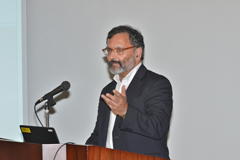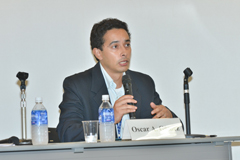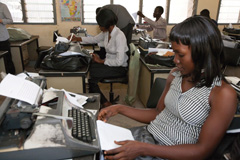Seminar on the Human Concepts — Human Development, Human Rights and Human Security — Held at JICA-RI
2016.10.03
Seminar on the Human Concepts — Human Development, Human Rights and Human Security — Held at JICA-RI
The family of human concepts — human rights, human development and human security — plays an important role in guiding both international relations and domestic policy. For example, Japan’s international cooperation policy has been influenced by human security ideas for over two decades. However, there have been debates over whether these human concepts may confront and undermine one another.
Des Gasper, professor of Human Development and Public Policy at the International Institute of Social Studies (ISS) of Erasmus University Rotterdam (The Netherlands), discussed the relationships between the human concepts, focusing on human security and human rights, in a seminar held at the JICA Ichigaya Building in Tokyo on Sept. 5, 2016. It was co-sponsored by JICA Research Institute (JICA-RI) and the Japan Association for Human Security Studies (JAHSS).

Professor Des Gasper gives a presentation
The opening remarks were given by Naohiro Kitano, director of JICA-RI. He gave an introduction to several works related to human security, including the JICA-RI research project "Human Security in Practice: East Asian Experiences," targeted at the 10 member countries of ASEAN, along with China, Japan and South Korea; the book “Japan’s Development Assistance,” to which multiple authors from JICA contributed chapters; and the JICA-RI Working Paper “Toward a Theory of Human Security” written by Akihiko Tanaka, former president of JICA, on the elements to consider in the theory of human security.
In the presentation, Professor Gasper first introduced his paper, written collaboratively with Shyamika Jayasundara at ISS, which investigated the relationships between and complementarity of the human security approach and the human rights approach, examined through a series of cases. It was prompted by an article by the leading human rights scholar Rhoda E. Howard-Hassmann, in which she asked whether human security analysis undermined the human rights regime. Presenting an opposing view, Gasper and Jayasundara’s paper called attention to the complementary and cooperative relationships between human security thinking and human rights thinking — which, he explained, were closely interlinked.
After remarking on the early foundations of human security thinking, most prominently in the United Nations, he explained how human security analysis is now widespread in many major lines of work, including on the human dimensions of environmental change, national and international migration, and societal change in general. The paper itself illustrated four areas that are extensively analyzed using a human security framework: the intranational level (gender violence), the national level (trajectories of development and conflict in Sri Lanka), the international level (irregular migration), and the global level (climate change).
Next Professor Gasper presented the paper’s attempt to organize the relationships between the policies, stances and languages of human security and human rights, which have many different elements, by characterizing and applying human security analysis. He drew parallels between two matching characterizations of human security analysis, from Amartya Sen and Karen O’Brien. Both itemized how individuals meet their basic needs and rights (the Equity dimension), did complex analysis of all the interlinked systems that affect this (the Connectivity dimension) and itemized the associated risks, threats and opportunities.

JICA-RI Research Fellow Oscar A. Gomez gives a presentation
He moved on to Howard-Hassmann’s picture, of two types of human security analysis: a broad view that undermines the human rights regime, and a narrow view only helpful for issues not covered by human rights analysis. Responding to her propositions, Gasper stated that broad systems analysis was fundamental in human security analysis and helps to deal with both issues that fit well into human rights conventions and problems that do not fit directly into human rights formats.
Moving to the case studies discussed in the paper, he highlighted two cases: violence against women and the global issue of climate change. He described the value that human security analysis could add in both cases. For discussion of violence against women, he highlighted the work of Mexican scholar Dorothy Estrada-Tanck, who has researched human rights court cases that relied on human security analysis. As for global climate change, he elaborated how the human security framework is more helpful, by leading to attention to global insurance arrangements for protection and compensation.
Lastly, he concluded that the broad scope in human security analysis adds depth in explanation, complementing the normative emphasis captured in human rights thinking. The mutual awareness, understanding and intelligent partnership of human security analysis and human rights analysis need to be strengthened, he said.
The presentation was followed by the remarks of Oscar A. Gomez, a research fellow of JICA-RI and secretariat of JAHSS. He observed that Gasper’s contribution was important to the survival of human security as a concept, as part of what he called “the second generation of human security thinking.” He added that the classification of “developing” countries did not make sense anymore and a different mutual language was needed for countries to collaborate on such issues as climate change. He also highlighted the need to address the problem of domestic violence in policy and research agendas.
In the Q&A session, multiple questions came from the audience in regard to the court cases that used human security analysis in their judgments, the concepts of “equity dimension” and “connectivity dimension,” complementarity of human security and human rights approaches, and endorsement of the human security discourse between developing countries and developed countries.
The seminar ended with closing remarks by Hideki Tamai, director of Soka University Peace Research Institute and a board member of JAHSS. Addressing security against terrorism, he said the presentation was helpful to deal with contradictions in the purposes of human security and to understand the complementarity of the human security and human rights approaches.
South Sudanese women in job training
(Photo: JICA/Shinichi Kuno)


事業事前評価表(地球規模課題対応国際科学技術協力(SATREPS)).国際協力機構 地球環境部 . 防災第一チーム. 1.案件名.国 名: フィリピン共和国.

事業事前評価表(地球規模課題対応国際科学技術協力(SATREPS)).国際協力機構 地球環境部 . 防災第一チーム. 1.案件名.国 名: フィリピン共和国.

事業事前評価表(地球規模課題対応国際科学技術協力(SATREPS)).国際協力機構 地球環境部 . 防災第一チーム. 1.案件名.国 名: フィリピン共和国.

事業事前評価表(地球規模課題対応国際科学技術協力(SATREPS)).国際協力機構 地球環境部 . 防災第一チーム. 1.案件名.国 名: フィリピン共和国.

事業事前評価表(地球規模課題対応国際科学技術協力(SATREPS)).国際協力機構 地球環境部 . 防災第一チーム. 1.案件名.国 名: フィリピン共和国.
scroll